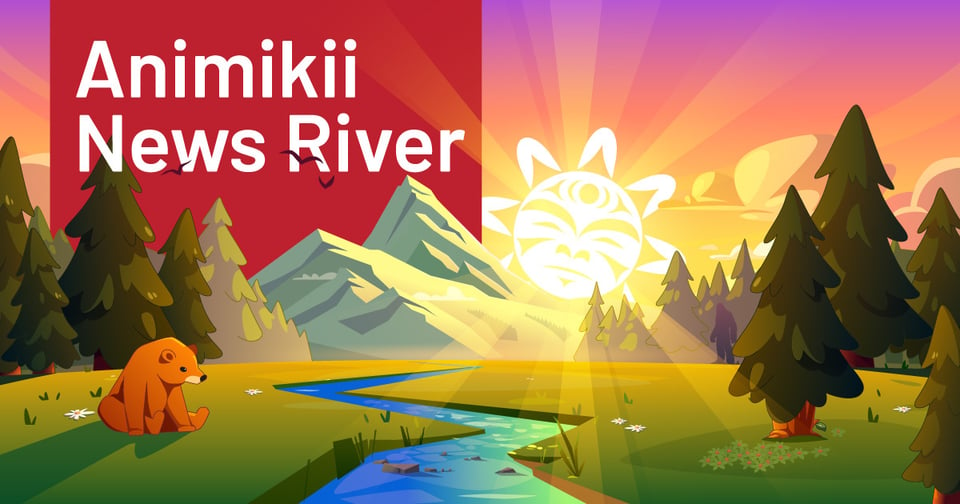Research Sovereignty: How Indigenous Communities Are Reclaiming Their Narratives
This week! Discover how the Bilingual Basketball League is revitalizing Indigenous languages, meet the groundbreaking Indigenous creators nominated for the 2025 Canadian Screen Awards, and explore how Haudenosaunee communities are reclaiming research sovereignty.

Boozhoo News River Readers,
We'd love to hear what you think about the stories we are sharing this week celebrating language, achievements in media, and community research. Your comments and replies help our conversations grow stronger and more meaningful. At the bottom of the newsletter you will see a link to comment on the online version of News River, or hit the reply button and we will get your comment.
This week’s stories include:
An article about how the Bilingual Basketball league is preserving Indigenous languages
A story about the Indigenous creators who are among 2025 Canadian Screen Award nominees in film, television, and digital media.
How investing in local research and training to support community development is moving towards Haudenosaunee research sovereignty
FEATURE
Tentewatenikonhra’khánion: “We Will Put Our Minds Together.”
How a Waterloo Canada Research Chair is decolonizing research methods and co-creating a path forward through community collaboration
The big picture: Dr. Talena Atfield’s research is grounded in community-based knowledge sharing and creation, and aims to increase access to Hodinosho:ni intellectual and cultural property held in museums and archives by interrogating the ideology of “the expert” and recentering community-led knowledge regeneration.
Why it matters: Early 20th-century anthropologists extracted material and cultural information under the “salvage ethnography” paradigm — believing they were preserving culture. All of Dr. Atfield’s research activities are driven by the wants and needs identified by members of the community using a relational approach.
Key points:
Trust is built by inviting community members to co-lead all stages of the project.
The research happens through community storytelling circles and crafting workshops, such as hide tanning and basket making.
Importantly, these engagements also constitute the research outputs, recorded specifically for community use.
What they're saying:
“My work acknowledges that there are no ‘experts,’ rather we all have knowledge we can share, and in this way, we are decentring colonial interpretation. It’s very much a group discussion about how our history interacts with the present, and how we might take it into the future.” Dr. Talena Atfield
What's next: Dr. Atfield’s forthcoming course is HIST238 Matriarchs, Warriors, and Aunties: Indigenous Women in Canadian History, as Assistant Professor in History at the University of Waterloo
Learn more: https://uwaterloo.ca/news/global-futures/tentewatenikonhrakhanion
CURATED ARTICLES
‘We play for Indian country’: how the Bilingual Basketball league is preserving Indigenous languages
Despite drastic cuts by the Trump administration, Native American coaches are teaching and defending traditions. The program is designed to support marginalized communities by providing free basketball camps that utilize bilingualism and sociolinguistics as part of their core mission to reclaim historically overlooked spaces through basketball.
For Six Nations of the Grand River, structural changes are required to operationalize Indigenous Research Governance and realize community development through Haudenosaunee-led research and training. The article emphasizes the importance of Indigenous Research Governance in Six Nations of the Grand River, addressing the harmful historical effects of academic research on Indigenous Peoples and advocating for structural changes that promote Indigenous data sovereignty and community ownership of research.
Tribes, long shut out from their own health data, fight for access and sovereignty
When Stephanie Russo Carroll, a citizen of the Native Village of Kluti-Kaah in Alaska, set out to earn her doctorate in tribal health 15 years ago, she focused her research on tribal cultural and health programs within six tribes. She needed vital statistics data, such as birth and death rates, for each of them. But getting that data from the state, which houses vital statistics, was difficult — and in some cases, the data she needed was missing. For the next two decades, Carroll would continue to push for U.S. tribes — which are sovereign nations — to own and maintain control over their data, including health statistics.
“When I studied art history, any art about Native people was from a non-Native perspective,” said Twenish, an Algonquin Anishinaabe artist who works primarily as a digital illustrator. “I like to take that power back in my work, and it felt like the statement ‘My Body is the Land’ articulates that. I can't be separated from my homelands. I am a part of them. They're a part of me.”
Revitalists use social platforms to share Indigenous language learning with a new generation
Novalee Fox is an Indigenous content creator from Ochapowace First Nation, who makes content to promote a healthy way of living, and Cree language revitalization. However, her language reclamation path didn't start until she was on a healing journey. Fox says she attended a treatment centre in Montreal Lake Cree Nation, where she stayed for four months dealing with drug and alcohol abuse. "My mental health therapist was fluent Cree, my elder was fluent Cree and also my [Native Alcohol and Drug Abuse Program Worker] was fluent Cree, so we conversed back and forth in Cree," she said.
"We always have goals that things are going to get some traction and be watched and well loved," said director Zoe Hopkins (Heiltsuk and Kanien'kehá:ka), whose comedy series Don’t Even received four nominations. Tanya Talaga's (Anishinaabe) docuseries The Knowing also received several nominations including Best History Documentary Program or Series, Best Direction, Best Writing, Barbara Sears Award for Best Editorial Research, and the Barbara Sears Award for Best Visual Research. The 2025 Canadian Screen Awards ceremonies will be held at the CBC Broadcast Centre in Toronto May 30 to June 1.

